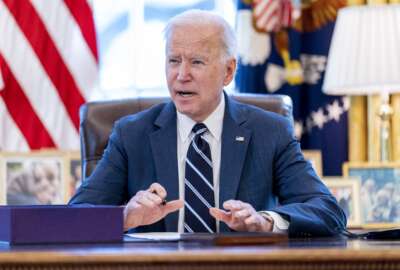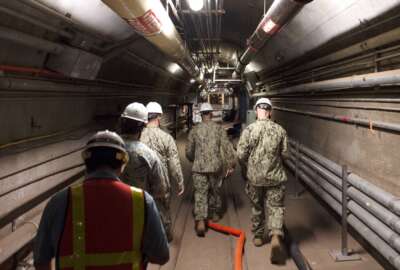The swirling sound you hear is Congress going ’round and ’round on some old ideas
The great flywheel of appropriations gets a big shove today with release of the administration's 2023 budget request, six months before fiscal 2023 actually starts.
Best listening experience is on Chrome, Firefox or Safari. Subscribe to Federal Drive’s daily audio interviews on Apple Podcasts or PodcastOne.
The great flywheel of appropriations gets a big shove today with release of the administration’s 2023 budget request, six months before fiscal 2023 actually starts. That’s not all in the way of spending Congress will be thinking about, as the Federal Drive with Tom Temin heard from WTOP capitol hill correspondent Mitchell Miller.
Interview transcript:
Tom Temin: Mitchell, let’s start with that budget release months late, but it’s always some sort of landmark day in D.C. for the people that think that’s what constitutes a landmark day.
Mitchell Miller: That’s right. It’s landing with a big thud today. And whatever the final figures turn out to be, as Congress moves this through, it’s clear that the Pentagon is going to get a sizable chunk of this federal funding. The White House wants well north of $750 billion, looking for around 4% increase over the current fiscal year. And it’s really tens of billions of dollars more than what was originally projected about a year ago. Of course, a lot has changed since then, with growing concerns about Russia’s attacks on Ukraine continuing concerns among lawmakers about China, there’s going to be a big push from Pentagon supporters here in Congress to provide even more money. Forty lawmakers, Republicans have written the administration seeking about a 5% increase, I think you’re going to see that annual look at the defense budget where they’re going to say nope, we need more. On the other hand, the Senate Armed Services Committee Chair, Jack Reed, has indicated he’s not ready to quite hand over a blank check, although he’s pretty strong, as you know, on defense and wants a strategy to drive the budget and not the other way around. But either way, I think we’re going to see a lot of dollars flowing the Pentagon’s way.
Tom Temin: Well, it will be interesting to see if one of those strategies is arm Taiwan to the teeth.
Mitchell Miller: Right. It very well could be. I mean, we’ve heard a lot of talk about that, especially given what’s happening with Ukraine.
Tom Temin: And Congress is still very much involved with Ukraine. You spoke with a couple of the local senators this week and what were they saying on that?
Mitchell Miller: That’s right, I spoke to Sen. Tim Kaine (D-Va.) and Sen. Mark Warner (D-Va.), of course, Mark Warner is the chair of the Senate Intelligence Committee, Sen. Kaine, a member of the Armed Services Committee. Both of them say the U.S. really needs to be committed to keeping the aid and support military aid flowing to the NATO allies. Of course, we had the president visiting with those allies over the weekend, and Kaine told me that he doesn’t think the U.S. can just sit back and assume that Vladimir Putin won’t attack a NATO ally at some point. So he says that means more resources. For example, talking about locally, Virginia, the Virginia-based, Norfolk-based aircraft carrier, Harry Truman is actually conducting airborne patrols with NATO allied forces in the Sixth Fleet in that general region. So he is, Sen. Kaine is very concerned about what’s happening there. NATO has doubled the number of military jets that are on alert in Europe. So these two Virginia lawmakers knowing what a big part of the military it is to the Commonwealth are very bullish on making sure that the support for NATO continues and also an ongoing concern, Sen. Warner being with intelligence, as you know, has always been very concerned about cyber attacks. We’ve heard a little bit more about that recently. And he has concerns that if the trip wire isn’t actually specifically identified, it could get a little dicey in terms of if there is a cyber attack by Russia on the U.S. or one of its allies. And so that’s a complicated thing that he is keeping a very close eye on.
Tom Temin: Right when they form NATO, nobody envisioned the idea of cyber attacks. But if it’s an attack, if it shuts down or does damage in a nation, then it’s as potent and can be as a bomb dropping somewhere.
Mitchell Miller: Exactly. And he’s actually surprised that the Russians haven’t done this more with Ukraine, which is not a NATO member. But as he points out, you know, there could be an attack on military equipment and a facility in Poland, for example, or another NATO country where jets are flying out, or maybe it’s just a matter of going after an energy facility. And then that raises the question, well, is that an Article Five, as they say, attack on NATO, which immediately causes a response from NATO and generally has been agreed to that it would be a military response.
Tom Temin: We were speaking with Mitchell Miller, Capitol Hill correspondent for WTOP. And on the domestic front, there’s actually discussion from Sen. Joe Manchin (D-W.Va.), you’re reporting of a somehow slimmed down, Build Back Better bill?
Mitchell Miller: That’s right, build back better has effectively been dead now for many months, but there’s a little bit of life being breathed into it. There was a report last week that Senator Manchin has been talking with some groups about maybe trying to get this back to as you indicated, a more slimmed down version. This is very early, very preliminary and Manchin has continually been open to things as we’ve gone through this but as you know, he’s also put a stake in it too for the White House when they wanted $3.5 trillion. What they’re now talking about reportedly is around $1.5 trillion. Manchin indicated to Axios last week that he’d be willing to consider things that would relate to climate change, perhaps reducing the deficit and then lowering prescription drug prices, which is very popular among Democrats. However, this does not include a lot of things that progressive Democrats have been seeking such as expanded childcare and mandatory pre-K. So we’ll see where this goes. It’s interesting that we’re this far into the year and because of everything internationally that we just talked about, a lot of these domestic agenda items have been kind of put on the back burner, in part because the Build Back Better plan just didn’t go anywhere several months ago.
Tom Temin: Well, we’ll have to see how that develops. That’s likely to be though after the elections, right, before anything could really get any momentum.
Mitchell Miller: Exactly. You put your finger on it. With the elections coming up, I just don’t see this really getting any kind of momentum.
Tom Temin: And what’s going on with respect to gasoline relief, I saw something about California going to give people like, I don’t know, Elon Musk, I guess does he still live there, a gas card or something? Could that happen at the federal level?
Mitchell Miller: Well, there is talk and speaking of the midterm elections, there’s a lot of nervousness obviously among Democrats about what can be done about these rising gas prices. So there are all kinds of proposals being floated now. And one of them that comes from Rep. Mike Thompson (D-Calif.), where the gas prices are sky high, is one along with other Democrats, it would give a $100 energy rebate payment to Americans any month during when the national gas price average is more than $4 a gallon, which of course it is now, and kind of like other rebates in the past, it would go up if you were a family with two children, you could get up to $300 a month. And then there are some more complicated proposals. One of them, Rep. Ro Khanna (D-Calif.) also from California, not surprisingly, has suggested raising taxes on oil companies and then through a complicated series of machinations, you would get a rebate of potentially close to $250 a year if you’re a single filer and higher for joint filers. There are other proposals Rep. Peter DeFazio (D-Ore.) who’s obviously been very involved with infrastructure and transportation issues over the years. He has a bill that would do something similar with oil companies. So there really is a scramble here by lawmakers to try to do something to help consumers.
Tom Temin: I’m still mad when high test one above 39 cents. That’s how long I’ve been driving. And we’re talking about $5 or $6.39. Crazy. And what about anything happening on the confirmations front because that was going for a while they’re in the Senate?
Mitchell Miller: It looks like basically a week from today the Senate Judiciary Committee is going to vote on the Supreme Court nominee’s confirmation. It is likely to be split right down the middle, Ketanji Brown Jackson. Democrats felt that she did a good job during her tough two days of questioning and hearings all last week. Republicans had their own reservations about it. Senate Minority Leader Mitch McConnell (R-Ky.) indicating late last week that he will not support, not surprising there. So what we’re shaping up there is probably one of the closest, if not the closest Senate vote ever on a Supreme Court nominee. The previous nominees it was a space of a couple of votes here and there for Kavanaugh and Amy Coney Barrett, but this one could actually come down to the vote by the vice president. We’ll just have to see if any other Republicans decide to join with Democrats.
Tom Temin: Mitchell Miller is Capitol Hill correspondent for WTOP as always, thanks so much.
Mitchell Miller: You bet.
Copyright © 2025 Federal News Network. All rights reserved. This website is not intended for users located within the European Economic Area.
Tom Temin is host of the Federal Drive and has been providing insight on federal technology and management issues for more than 30 years.
Follow @tteminWFED






